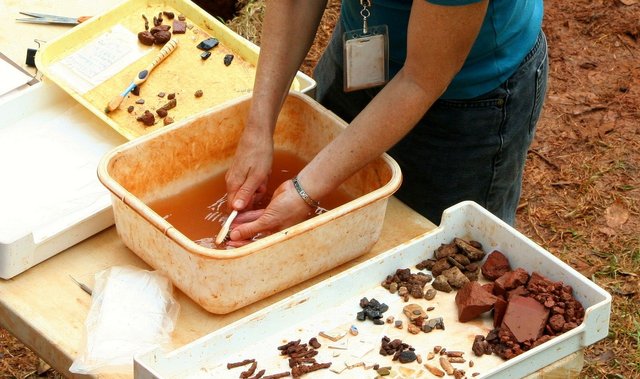I have been binge-watching Time Team, a BBC program(me?) about archaeology in Britain. In each episode, a team of archeologists have three days to explore a given site with geophys, excavations, and historical documentation in an effort to reveal new information or answer a specific question.

Image credit
Of course, Britain's archeological landscape differs widely from that of the western United States where I live. Here, it was essentially stone age semi-nomadic societies up until just a few hundred years ago. The oldest buildings in Washington, Oregon, and Idaho only date back to the mid-1800s. Meanwhile on Time Team, they find stone age flint shards under prehistoric bronze age settlements beneath Roman ruins buried by the remnants of long-gone medieval villages in some farmer's field.
This all leads me to a somewhat melancholy thought: what will people be digging up from our settlements in another 2,000 years? Assuming of course that nuclear war, catastrophic climate change, or any number of other predicted disasters don't wipe us out first. I hate to imagine harlequin romance novels are somehow preserved as our only literary legacy, for example.
If something does disrupt electronic technology, everything here on Steemit as well as every other electronic byte of data could be obliterated in the blink of an eye. Plastics would likely be preserved, and I imagine people carefully brushing away dirt to uncover candy wrappers while speculating about our diets. I wonder whether Barbie will be deemed a fertility idol, and GI Joe a household god of war?
It is sobering to realize someone may dig though my bones or ashes in some graveyard with no knowledge of my struggles, failures, pain, and triumphs. What does it all mean? Why do we strive to build something that will inevitably collapse into dust and then be left as little more than a trace of discolored dirt? This line of thought could result in anything ranging from slight ennui to existential despair, or a hedonistic drive to experience as much pleasure as possible during our fleeting existence since nothing is permanent anyway.
Theology offers an explanation if you are open to the possibility of truth and meaning outside the realm of hard science. Is our purpose to become better people, to draw closer to a divine ideal? The cynics might respond, "well, apparently it's just to murder any who disagree with you," but that is uncharitable to say the least, especially considering the body count racked up in the name of the political systems the "social scientists" have advocated.
Where do all these musings lead? Nowhere, really. No tidy conclusions are in store to wrap up this meandering mess. Sorry.
Downvoting a post can decrease pending rewards and make it less visible. Common reasons:
Submit
The genius of The Far Side may never be surpassed.
Downvoting a post can decrease pending rewards and make it less visible. Common reasons:
Submit
Okay, that set me off laughing! Then I got to thinking about Bratz dolls, Legos, Matchbox cars, piggy bank collections, and Tupperware, which will still be there and have a good seal. (We know that from watching "Alladin.") Who knows what conclusions will be reached about us?
Downvoting a post can decrease pending rewards and make it less visible. Common reasons:
Submit